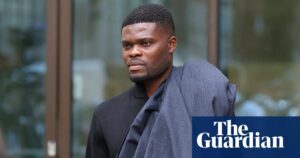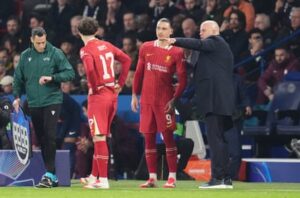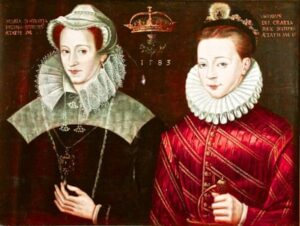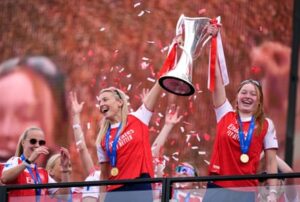‘It’s often dealing with quite elemental things,” says the vocalist Gwretsien Ferch Lisbeth of Tristwch y Fenywod’s music. “The sense of being in an ancient landscape; or the enchanted, sapphic feeling of being by the ocean. Our music addresses things that are simple and foundational, but very powerful.”
Released last August – and now being performed live by the band across the summer festival circuit – the trio’s self-titled debut album is a lush, cathartic mix of gothic instrumentation and eldritch melody, like a lost Cocteau Twins masterpiece recorded in a cave in Eryri, stirring intense feelings even in those who can’t understand its Welsh lyrics. There’s a political dimension too. “The oppression of the Welsh language over the past 200 years was so aggressive,” says the drummer Leila Lygad, citing how Welsh children were forced to speak English in 19th- and 20th-century schools. “It feels important to champion languages that have been oppressed by colonial systems.”
Formed in Leeds by members of the underground groups Guttersnipe, Hawthonn and the Courtneys, and using Welsh pseudonyms for the project, Tristwch y Fenywod tap into a particularly Welsh mysticism. Ferch Lisbeth was born in Bangor, and lived in North Wales until the age of 12. “I always found it to be a very mystical place,” she says. “The language was definitely part of that, although we were in the minority of not being a Welsh-speaking family.”
Before living in Leeds, Lygad grew up on the nearby Staffordshire-Shropshire border, and spent her childhood “walking on Penmaenmawr mountain” – on the North Wales coast – “and visiting the first stone circle I’d ever been to”, which sparked “a lifetime interest in archaeology, history and Welsh culture”.
Ferch Lisbeth’s family moved her to England aged 12, but the landscape and language of Wales stayed in her subconscious. In 2020, after discovering a friend on the Leeds experimental music scene was a fluent speaker, she dedicated herself to learning Welsh “obsessively, every minute of every day”. She’d also started to date the band’s third member, the Canadian bassist Sidni Sarffwraig, and the pair visited North Wales together. “Having this beautiful sapphic connection in those places felt profound,” says Ferch Lisbeth. “It was some logical arrival of fate for me; different threads of the psyche converging.”
When Tristwch y Fenywod formed in 2022, Ferch Lisbeth was driven to sing in Welsh about queerness, mysticism and belonging, because “maybe no one’s ever written a song in Welsh from this perspective, and it’s about time it existed.” Their band name translates to “the sadness of women”, and they are inspired by the “stately, elegant, feminine sadness” of groups such as Dead Can Dance.
They also embrace the experimental amateurism of the 1970s no wave scene. Lygad plays electronic drums, programmed with unconventional sounds from field recordings. Her snare is a recording of a snapping toy from a joke shop she exploded in an underground bunker, while her toms are the clicks made by echolocating bats, a particularly goth detail of her set-up. Sarffwraig plays a standard bass guitar, but Ferch Lisbeth plays a self-made instrument she calls a dwydelyn – Welsh for “two-harp” – constructed from two zithers and a contact mic: “I was thinking about Celtic harp music, and the first Dead Can Dance record where Lisa Gerrard is playing the yangqin [a Chinese dulcimer].”
The three of them talk admiringly about the adventurous atmosphere they’ve cultivated within the band, and that’s echoed in the Leeds scene that nurtured them. At the centre is the DIY venue Wharf Chambers, an accessible, co-op-run venue where, according to Ferch Lisbeth, “honesty is rewarded and genuineness of expression is the goal”. This is especially crucial for a band who are all neurodivergent. “For neurodivergent people, experimental music is a space to unmask and be publicly witnessed experiencing intense emotions,” says Sarffwraig. “The scene around Wharf Chambers gave us space to do something weird in a language people don’t understand. DIY venues have to be protected because they’re so important for experimentation.”
The band have found a similarly supportive second home in North Wales, in a community of alternative Welsh and Welsh-language musicians such as Anxiolytics, Sister Wives and Cerys Hafana that has “a very wholesome, casual inclusion of queer, trans and neurodivergent people”, according to Ferch Lisbeth. Established Welsh musicians have shown support, including Datblygu and the Super Furry Animals producer Gorwel Owen, members of Fflaps, and the singer Gwenno, who has recorded albums in Welsh and Cornish. “Gwenno is a very important figure,” says Lygad. “She’s championing minority languages and is an outspoken anti-capitalist and anti-colonialist.”
Outside of Wales, Tristwch y Fenywod have a kinship with groups such as Kneecap and Lankum, who share their anti-colonial approach to language and folk tradition. “It’s been lovely seeing Kneecap have success with the Irish language and take it to the mainstream, because that’s where it should be,” says Lygad.
The band hope their music inspires people to learn Welsh, or other minority languages, for pleasure and resistance. “People talk about wanting large-scale systemic change, but they’re still using the [English] language of laws and power structures,” says Ferch Lisbeth, who sees every language as “a different system of perception”. They also model a radical connection with history and heritage. “There’s a way of respecting the past and tradition without the politics of nationalist ideas,” says Sarffwraig. “Welsh is ancient, and allows you to connect with the way people were living a really long time ago. It’s unfair that people with conservative politics get to have a monopoly on that culture and history. We’re resisting that.”









